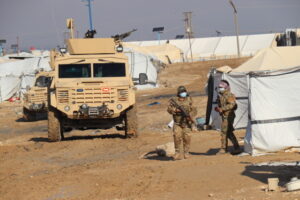A US-backed rebel alliance led by Syrian Kurds has seized the largest city in the east of the country, the main border crossing with Iraq, putting it in de facto control of the eastern Syrian desert in two surprise moves.
Two sources close to the security services based in eastern Syria said that this afternoon the Syrian Democratic Forces (SDF) had captured the town of Deir ez-Zur. It is the third town to fall to Syrian President Bashar al-Assad’s regime in a week.
Omar Abu Layla, an activist with the 24 news platform who has contacts in the city, told Reuters that government forces and Iranian-backed Iraqi fighters had withdrawn from Deir ez-Zur. Shortly afterward, the SDF entered the city from the nearby Albu Kamal border crossing, according to two Syrian army sources.

Deir ez-Zur has changed hands several times since Syria’s civil war broke out in 2011. First, it was taken over by rebels and then, in 2014, by Islamic State. The Syrian army, backed by Tehran-backed Iraqi militias, recaptured it in 2017 and has held it to this day.
The SDF’s advance came as Syrian rebels led by the Islamist group Hayat Tahrir al-Sham (HTS), the former al-Qaeda offshoot, were moving rapidly towards Homs city after capturing Aleppo and Hama in a week.
SDF chief Mazlum Abdi told reporters earlier in a press conference in Hasakah that his forces have “channels of communication with the HTS”, particularly to protect Kurds living in Aleppo. He noted that the SDF has not clashed with the HTS but would defend itself if attacked. He also added that they are in contact with both the US and Russia to protect the areas under their control.
Abdi, whose forces have clashed in the past with both the Syrian army and Tehran-backed Iraqi fighters, said he was surprised to see government forces collapse so quickly in the face of the insurgent onslaught.
In a highly symbolic scene, a statue of former President Hafez al-Assad was destroyed
In a highly symbolic scene, a statue of former Syrian President Hafez al-Assad was destroyed by residents in the city of Hama after rebels led by Islamist extremists entered the city, according to a video verified by the French news agency.
Videos were posted on social media last night showing the demolition of the statue, in an image reminiscent of the removal and destruction of a statue of former Iraqi President Saddam Hussein in al-Fardous Square in central Baghdad on April 9, 2003.
Hussein’s statue was knocked down by a US armored vehicle and when it fell to the ground angry Iraqis began stomping on it and breaking it, an image that has gone down in history as the beginning of the former dictator’s downfall.
In Hama, in central Syria, a large machine knocked down a statue of Hafez al-Assad, the father of current President Bashar al-Assad, to the cheers of a crowd chanting “Allahu Akbar” (i.e. God is great) and gunfire fired into the air in celebration.
A voice is distinctly heard saying “Thank God” as the statue begins to fall.
Other images taken today by a French News Agency reporter show the unscrewed head of the former president’s statue being pulled from a vehicle on a city street.
A group of youths celebrated the city’s fall into rebel hands by shouting: “Freedom forever against your will, O Assad,” a reference to the Syrian president.
Citizens also celebrated in the streets as rebels entered the city, while armed fighters rode through the streets to the cheers of the crowd on vehicles, promising to continue their advance by reaching the capital Damascus, and freeing prisoners in regime jails.
Opposition fighters have captured a central military base in the southern province of Daraa
Syrian local fighters and former rebels have seized one of the Syrian army’s main bases, Liwa 52, in Daraa province, near the city of Herak, as fighting spreads across Syria’s southern border with Jordan, two rebel sources told Reuters.
Militants and rebels have also seized parts of the Nasib border crossing with Jordan, near the customs post there, where dozens of trucks and passenger cars have been trapped, sources added.
Belonging to the Alawite minority, a branch of Shi’ism, the Assad family has ruled Syria with an iron fist for more than five decades.
Bashar succeeded his father Hafez in 2000. In 2011 Bashar faced a popular uprising, which he harshly suppressed, and the protest movement turned into a civil war.
On 27 November, a coalition of rebels led by the jihadist-led Hayat Tahrir al-Sham (HTS) launched a surprise offensive in the northwestern part of the country and captured several towns in the most spectacular advance in 13 years of war.
In a matter of days, the rebels captured large swathes of northern Syria and much of Aleppo, the country’s second-largest city. The strategic city of Hama fell into rebel hands yesterday (Thursday), increasing pressure on President Bashar al-Assad.
After the rebels entered Hama, residents took to the streets to cheer them on, according to images obtained by the French news agency. Some set fire to a giant portrait of the Syrian president posted on a municipal building.
Hama has been the site of a massacre, perpetrated by the army in 1982 during the days of Hafez al-Assad to quell a Muslim Brotherhood uprising.
Ask me anything
Explore related questions

